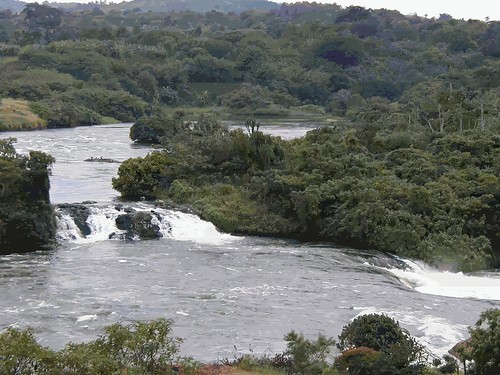
A photograph of the Nile Basin region of Uganda. A treaty is close to being agreed upon to integrate economic cooperation among African states where the world's longest river flows., a photo by Pan-African News Wire File Photos on Flickr.
Egypt, Sudan look at Nile water
Joseph Mayton | 26 December 2011
Egypt looking at Nile water strategy
.
CAIRO: Egypt and Sudan are both concerned over the historical agreements that deliver them the lion’s share of water from the Nile River. On Sunday, the two countries’ water officials met in the Egyptian capital, looking to continue their hegemonic status atop Nile water.
According to Egypt’s state-run MENA news agency, Egypt’s Water Resources and Irrigation Minister Seif el-Din Hamad and newly appointed Prime Minister Kamal al-Ganzoury met with Sudan’s ambassador to Egypt Kamal Hassan Ali to continue to push forward on agreements concerning the Nile Basin Initiative – the mechanism by which Nile water is delineated among the member states along the world’s longest river.
The meeting reportedly discussed the overall situation in the countries of the Nile Basin with a focus on the outcome of the meeting earlier between the Egyptian and Sudanese delegations and the decisions taken.
The encounter also touched on bilateral relations between ministries of water resources in Egypt and Sudan as well as ways to achieve cooperation between the two countries and to unify visions on pending issues of the countries of the Nile Basin.
According to Minister Hamad, the Egyptian Prime Minister has directed the Minister of Water Resources and Irrigation “to provide technical assistance and training to the Sudanese center for water resources and irrigation. A range of economic issues between the two countries have also been discussed especially in the fields of roads and electricity,” he added, and affirmed the “keenness of the Egyptian Government to provide required support for all economic projects between the two countries.”
A tripartite committee was set up comprising experts from the countries with a view to form a mechanism to discuss and reach understanding on the issues on the table including criteria for selecting international experts.
But not all is well in the Nile Basin, with other member states demanding Egypt and Sudan give up their dominance of water rights and have demanded an end to over a half-century old treaty established under British colonial rule that allows Egypt more than 80 percent of all water.
In Egypt, however, there are worries that giving up its rights would bring about a massive water shortage in the country that could have detrimental social and political affects on the country and have not budged from amending previous agreements, angering upstream nations, especially Ethiopia, which has gone forward with plans for a massive dam along their portion of the Nile to generate electricity.
No comments:
Post a Comment